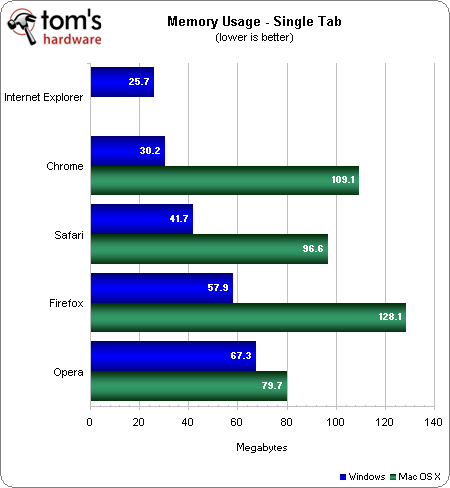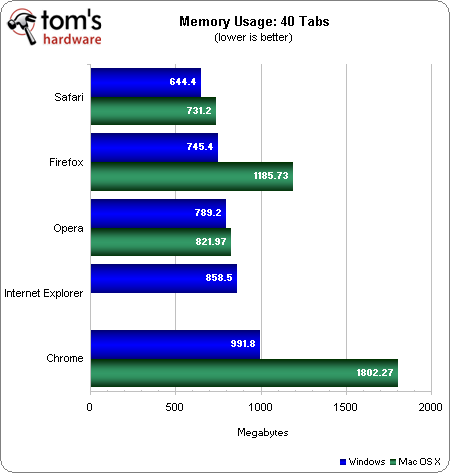Web Browser Grand Prix VI: Firefox 6, Chrome 13, Mac OS X Lion
Chrome 13, Firefox 6, Safari 5.1, and Mac OS X Lion (10.7) have all emerged since our last Web Browser Grand Prix. Today, we test the latest browsers on both major platforms. How do the Mac-based browsers stack up against their Windows 7 counterparts?
Efficiency Benchmarks: Memory Usage
Light Load
The placing for single-tab memory usage remains the same as what we saw in WBGP5, with IE9 in the lead, closely followed by Chrome, Safari, Firefox, and Opera.
On Mac OS X, all of the memory usage totals are higher than Windows 7, and the order is re-arranged. The top spot goes to Opera. Second place goes to Safari 5.1, with just under 100 MB. Chrome takes third, while Firefox uses nearly 130 MB to finish last.
Heavy Load
For the first time in the WBGP, Safari manages to fully load all 40 tabs at the same time without freezing. Previously, we had to open each of the 40 tabs individually in Apple's browser.
In WBGP5, we also reported some odd behavior from Internet Explorer 9 in these tests. Microsoft's browser would display certain white space-heavy pages in all black, and sometimes freeze entirely. This time around, we used the WHQL-certified AMD graphics driver provided by Windows Update instead of the company's website, and this phenomenon did not occur. After running through the full benchmark suite, we installed the latest Catalyst suite and retested. Sure enough, the wonky behavior returns with the Catalyst driver installed. The video below shows the white space issue on Wikipedia at 1:20:
The next video show the complete freeze-up at 1:50:
Get Tom's Hardware's best news and in-depth reviews, straight to your inbox.
Now on to this story's 40-tab memory test:
The order again looks similar to what we saw last time. Safari uses the least amount of RAM to open 40 tabs. Firefox retains its second-place status, consuming three-quarters of a gigabyte. Opera is not far behind in third, still under 800 MB. Chrome 13 drops to fifth, allowing Microsoft's IE9 to jump into fourth.
In OS X, Safari 5.1 still uses the least memory of any Web browser, though nearly 100 MB more than it does in Windows. Opera moves to second place with 40 tabs open in OS X, hovering just over the 800 MB line. Firefox 6 uses nearly 1.2 GB to take third, while last-place finisher Chrome 13 uses a a whopping 1.8 GB.
Current page: Efficiency Benchmarks: Memory Usage
Prev Page Performance Benchmarks: HTML5 Hardware Acceleration And WebGL Next Page Efficiency Benchmarks: Memory Management-
adamovera ne0nguyThe first chart says "higher is better" for the load timethank you, workin' on itReply -
SteelCity1981 Chrome is the best browser out there right now. While FireFox maybe more popular then Chrome is, Chrome has shown why it is the best browser out today. If you haven't used Chrome yet it's def worth a look.Reply -
soccerdocks The reader function in safari actually looks really nice. Although I'd never use Safari on principle. I hope other browsers implement a similar function.Reply -
mayankleoboy1 why does firefox(6/8/9) performa so horribly on the IE9 maze solover test?Reply
chrome13 completely obliterats it.
and firefox 8/9 are still a memory hog.
not really surprised by poor show of ie9. moat updates it gets are "security updates". -
tofu2go Being on a Macbook with only 3GB of memory, memory is the most important factor for me. I open a LOT of tabs and I keep them open for long periods. For awhile I used Chrome, but recently switched to Firefox 6 and saw my memory utilization drop by well over 1GB. Granted with Firefox I was able to do something I am not able to do in any other browser, I could group my tabs into tab groups. I believe this allows for more efficient memory management, i.e. only the current group uses much memory. Not having done any tests, this is pure speculation. All I know is that I'm seeing MUCH lower memory usage with Firefox on OSX. Despite what this article would suggest.Reply -
andy5174 @Google:Reply
Bring back the Google Dictionary, otherwise I will use Bing Search, Firefox and Facebook instead of Google Search, Chrome and G+. -
kartu ReplyFirefox 6 comes in third for both OSes, representing a major drop from Firefox 5.
According to the graphic on "Reliability Benchmarks: Proper Page Loads" on MacOS Firefox is actually second, not third. -
LaloFG I keep Opera, more memory used and time to load pages is nothing when it load pages correctly; and the feeling in its interface is the greater.Reply

